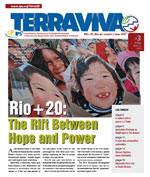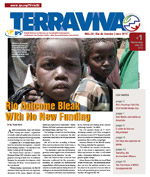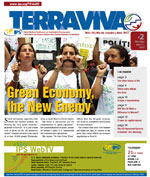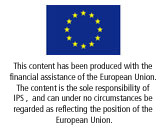By Julio Godoy
RIO DE JANEIRO, Jun 18 (TerraViva) The Latin American social and economic experience of the past 10 years, of steady and yet sustainable expansion that helped lift some 73 million people from poverty, is an example for other developing countries.
But it also constitutes a challenge for the future, for the region must reconcile continued growth and the preservation of its own natural resources.
So said Hasan Tuluy, vice president of the World Bank for Latin America and the Caribbean, while attending the first world congress of environmental legislators in this Brazilian metropolis ahead of the Rio+20 U.N. Conference on Sustainable Development.
The Latin American economic performance during the past decade, “a period of very substantial growth, with average rates of four percent per year, of reduction of poverty and inequality, and of expanding middle classes, resonates for many emerging economies,” Tuluy, a Turkish national, told TerraViva.
This steady, socially inclusive and green growth “constitutes a very important moment in the global development agenda”, he said.
However, he warned that “there is no room for complacency.”
“The choices we make today lock in processes for the next 20, 30 years, and will affect the lives of future generations. That is the challenge of our day,” Tuluy said.
Tuluy explained that the Latin American socioeconomic performance was based on four factors – economic growth with sound macro-financial policies, political stability, sustainability, and social fairness, to make the expansion inclusive.
These four factors “have come together simultaneously, and are the result of pragmatism of governments and civil society, of solid democratic manners, and of openness.” Tuluy said that “there are lessons to be learned (from Latin America), and which can serve as examples elsewhere around the world.”
He highlighted Brazil as a country “with a clean energy matrix, which has moved to energy independence through the expansion of alternative energy sources such as hydroelectricity, ethanol, and bio-diesels”.
“Brazil’s ethanol production is recognised to be financially and environmentally sustainable without diverting cropland for ethanol production,” the World Bank executive said.
Tuluy also mentioned Argentina, “moving forward with alternative renewable energy in rural areas providing affordable and reliable electricity to communities with a clear impact on productivity and jobs.”
Such examples explain why Latin America, despite its relatively high economic growth, today has the energy matrix with the lowest carbon emissions in the world. This matrix could be improved if Latin American countries would upgrade and connect their national energy systems across borders, to benefit from potential synergies and renewable sources, such as wind and sun.
“In these areas, Latin America has still a long way to go,” Edde Ijjasz, Colombian national and sector director at the World Bank for sustainable Development, told TerraViva.
Ijjasz pointed out that the massive investments in industrialised countries, such as Germany, and in emerging economies, such as China, in solar energy technology, in particular in the photovoltaic sector, have lowered prices and improved efficiency, “changing the energetic equation for Latin America”.
“We must reap the benefits of such developments, to further green our energy generation, and connect our grids beyond the national borders,” Ijjasz said.
He said Central American countries are starting to launch a transnational grid, and South American countries along the Pacific coast want to connect their energy generation systems, “but these processes are still at their beginning.”
Tuluy said that Latin American countries, when evaluating the modernisation of energy technology, should factor the resilience of technology into their choices. “Nuclear energy would not pass the test of resilience,” he said.
Yet another important factor contributing to reduced greenhouse gas emissions in Latin America during the past decade was “the conservation of the existent forest, and the promotion of reforestation with native species,” Tuluy added.
Tuluy warned that the present global financial and economic crisis should not be used as an excuse to reverse the trend towards a more inclusive green growth.
“Separating the move towards a low carbon, greener, cleaner, more efficient, more resilient and more inclusive development path from economic growth would miss the opportunity of giving an extra push to a sustainable growth paradigm which can fully integrate much needed economic growth with medium term signals to tackle climate and energy security,” he said.








 Add to Google
Add to Google







